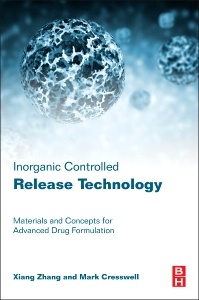Inorganic Controlled Release Technology Materials and Concepts for Advanced Drug Formulation
Auteurs : Zhang Xiang, Cresswell Mark

Inorganic Controlled Release Technology: Materials and Concepts for Advanced Drug Formulation provides a practical guide to the use and applications of inorganic controlled release technology (iCRT) for drug delivery and other healthcare applications, focusing on newly developed inorganic materials such as bioresorbable glasses and bioceramics. The use of these materials is introduced for a wide range of applications that cover inorganic drug delivery systems for new drug development and the reformulation of existing drugs. The book describes basic concepts, principles, and industrial practices by discussing materials chemistry, physics, nano/microstructure, formulation, materials processing, and case studies, as well as the evaluation and characterization of iCRT systems commonly investigated during industrial R&D.
Chapter 2. Fundamentals of Drug Controlled Release
Chapter 3. Characterization of Inorganic Controlled Release Technology
Chapter 4. Silica-based Amorphous Drug Delivery Systems
Chapter 5. Bioactive Glass-ceramic Controlled Release Systems
Chapter 6. Calcium Phosphate Materials for Controlled Release System
Chapter 7. Other Inorganic Controlled Release Technology
Chapter 8. Future development of iCRT
Dr Mark Cresswell is a Senior Scientist at Lucideon and has been instrumental in developing Lucideon’s iCRT (inorganic Controlled Release Technologies) research programme. His research covers a wide spectrum of the chemical sciences which has enabled him to become an expert in his field. In addition to the inorganic chemistry discussed in this iCRT book, he has good experience in organic synthetic chemistry. This includes the development of new synthetic routes for solution-phase-based peptide synthesis and the use of a diastereoselective Pictet-Spengler reaction to generate optically pure tetrahydro-ß-carbolines. This methodology was then applied to the a
- Provides the first book on inorganic controlled release technology (iCRT), covering key aspects from chemistry, physics, synthetic methods, formulation design, characterization and evaluation
- Includes several industry-related case studies to provide practical guidance on how to use iCRT as an alternative to organic polymers systems for both future drug developments and other active ingredient applications
- Demonstrates how iCRT offers an unmet business need for improved, controlled release of actives versus traditional CRT systems, which are known to have difficulty with the controlled delivery of both poorly and highly water soluble drug compounds
Date de parution : 08-2015
Ouvrage de 264 p.
15x22.8 cm
Thème d’Inorganic Controlled Release Technology :
Mots-clés :
inorganic controlled release technology (ICRT); inorganic drug carriers; API distribution; inorganic matrix; kinetics; chemical analysis; physical characterization; microscopy; silica-based systems; silicate templates; surfactant-aid templates; drug loading; amorphous silicates; biphasic glasses; melt-cooling; leaching; glass-ceramic release; therapeutic ions; calcium phosphate; medical device coatings; hydroxide systems; clay systems; halloysite systems; aluminate systems
